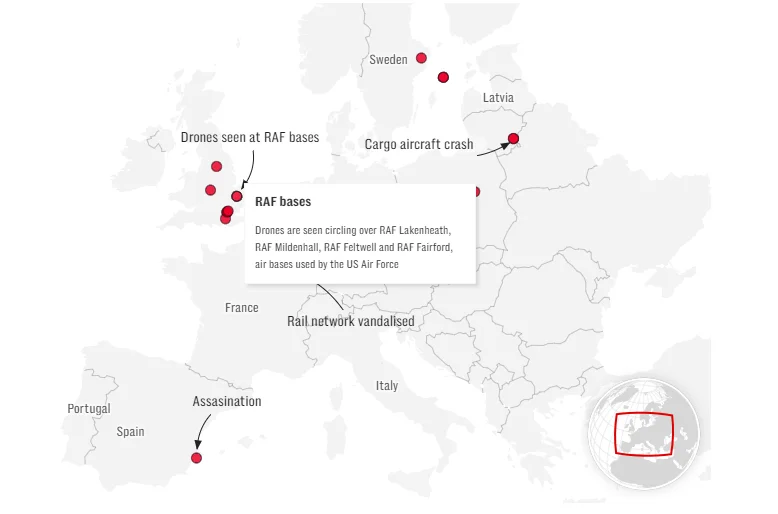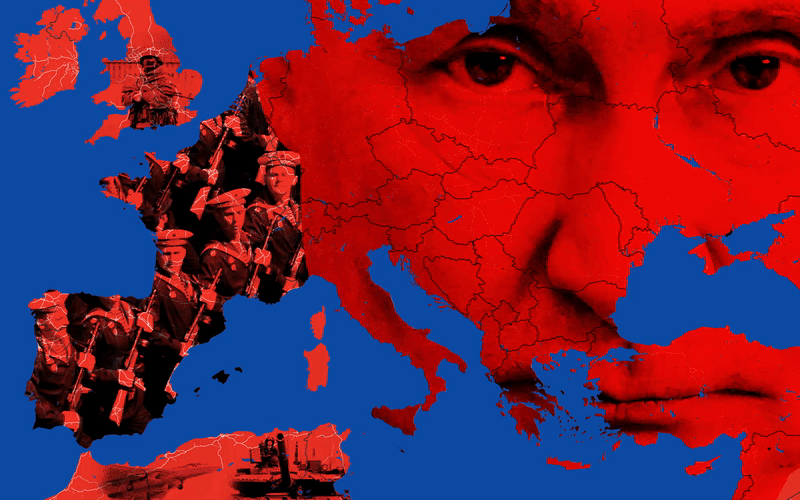Isolated incidents might be dismissed as coincidences—freak accidents, sporadic attacks, or unlucky infrastructure failures. A DHL cargo plane crashes near Vilnius airport. Bomb threats disrupt London hotspots like Euston Square, Gatwick Airport, and the U.S. Embassy. Drones are sighted circling U.S. Air Force bases in the U.K. An explosion devastates a weapons manufacturing plant in Wales. Telecommunications cables in the Baltic Sea are severed. Arson claims a Ukrainian-owned business in East London. Czech rail systems face interference. A ransomware attack cripples an NHS provider. Satellite disruptions cause European broadcast outages. A defector is gunned down in Spain. An assassination attempt targets a German arms executive.
Yet, these events are not isolated. Taken together, they suggest a troubling pattern: over the past year, as the West continues to support Ukraine, Russia has escalated its campaign of sabotage across Europe and beyond, creating instability unmatched since the Cold War.
A Campaign of Chaos
Western intelligence agencies are increasingly vocal. MI5’s director general, Ken McCallum, recently warned of “continued acts of aggression” on Western soil, including arson, sabotage, and other reckless actions by Russia’s GRU. This, he said, is a “concerted campaign” requiring a robust response. Bruno Kahl, head of Germany’s foreign intelligence service, echoed this concern, noting the growing threat of hybrid warfare and the potential for NATO to invoke its collective defense clause. Similarly, Sir Richard Moore, chief of MI6, described Russia’s actions as part of a “morally bankrupt axis of aggression” led by Vladimir Putin.
Mounting Evidence
The scale of Russia’s hybrid warfare is staggering, blending visible and clandestine operations. Firebombing a Ukrainian-linked business in London is linked to Wagner Group operatives. Incendiary devices sent to DHL hubs in the U.K. and Germany hint at a coordinated effort to ignite fires aboard aircraft. More broadly, reports suggest Russia is recruiting proxies—disaffected individuals, organized crime groups, and opportunists—instead of relying solely on its own agents.
This strategy offers plausible deniability while enabling a high volume of low-cost operations. A Royal United Services Institute (RUSI) report highlighted how Russia pays operatives as little as £53 for propaganda stunts or a few hundred dollars for sabotage, leveraging the economics of the gig economy to its advantage.

A Historical Playbook
Russia’s tactics echo Cold War-era strategies, when the KGB orchestrated sabotage plans targeting infrastructure and spreading chaos. These operations, now updated with modern technology, show Putin’s continued reliance on “the dark arts” of espionage and disruption, a legacy of his KGB training.
The recent shift to using local recruits, however, marks a departure. Experts note that while this approach increases operational risks for Moscow, even a low success rate achieves its goal of destabilization. Such tactics sow fear and confusion, while allowing Russia to project an image of omnipotence.
The Need for a Unified Response
Experts agree that the West cannot afford to ignore this growing threat. Oleksandr V. Danylyuk, former head of Ukraine’s Foreign Intelligence Service, calls for an international platform akin to the post-9/11 counter-terrorism effort, focused on combating Russian subversion. Keir Giles of Chatham House warns that Russia’s preparations may pave the way for overt aggression, targeting Europe’s logistics and emergency response systems.
The stakes are high. As Calder Walton, author of Spies: The Epic Intelligence War Between East and West, cautions, history offers “chilling echoes of 1914.” Without decisive action, the West risks sleepwalking into broader conflict.
A Test of Resolve
Russia’s hybrid war tests the West’s patience and unity. It challenges governments to recognize the threat, mobilize resources, and respond with strength and coordination. The alternative—unchecked escalation—risks dragging the world closer to open conflict.
As 2024 ends, the question remains: how long can the West afford to wait?
